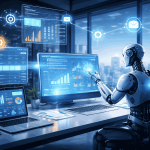
Future of AI-Optimized HPC Hardware: 2025 Innovations
Introduction
The rapid evolution of AI-optimized HPC hardware is reshaping how we train machine learning models and run simulations. From data centers to research labs, new innovations are boosting speed, efficiency, and performance.
In this article, you’ll learn about the latest hardware developments, upcoming trends, and how they impact real-world AI and high-performance computing (HPC) tasks.
What Is AI-Optimized HPC Hardware?
HPC hardware is built specifically to run artificial intelligence and high-performance computing workloads faster and more efficiently. It combines the power of GPUs, CPUs, memory systems, and interconnects in a way that supports heavy AI training, scientific research, and deep data analysis.
Key Features of This Hardware:
-
High memory bandwidth for faster data processing
-
Specialized AI accelerators (like TPUs or NPUs)
-
Low-latency interconnects (like NVLink or InfiniBand)
-
Energy-efficient cooling systems
These systems are now essential across industries like healthcare, aerospace, and finance.
Recent Trends in AI-Optimized HPC Hardware
The field of HPC hardware is moving quickly. Let’s look at the most exciting trends.
1. AI-Specific Chips
New AI chips like NVIDIA’s H100 and AMD’s Instinct MI300X are designed to handle massive AI workloads. These chips are optimized for matrix math, which is essential for deep learning.
2. Next-Gen GPUs and Accelerators
GPUs remain at the heart of AI and HPC systems. The latest models offer:
-
More cores
-
Larger cache
-
Support for mixed-precision computing
This allows faster model training with lower power use.
3. Liquid Cooling in Data Centers
High-performance workloads generate heat. Liquid cooling is replacing air-based systems to keep temperatures low while maintaining performance. This change is key to scaling HPC hardware.
What’s Next for AI-Optimized HPC Hardware?
1. Integration of Quantum Processing
Quantum computing is still early, but it’s starting to connect with traditional systems. Soon, optimized HPC hardware may include quantum coprocessors for specific tasks like optimization or simulation.
2. Unified Memory Systems
Future systems will likely move to a single shared memory model. This means CPUs, GPUs, and accelerators can all access the same data, reducing bottlenecks.
3. AI-Aided Hardware Design
Ironically, AI is helping design better AI chips. Using ML algorithms, engineers can optimize chip layouts and power use, resulting in even more powerful optimized HPC hardware.
Benefits of Upgrading to AI-Optimized HPC Hardware
If you’re considering upgrading your infrastructure, here’s what you’ll gain:
Improved Speed and Efficiency
Modern systems complete AI tasks in a fraction of the time, saving hours or even days.
Reduced Costs
More efficient hardware uses less power and needs fewer resources, reducing operational expenses.
Scalability
As workloads grow, AI-optimized HPC hardware can easily scale across multiple systems or cloud setups.
Real-World Use Cases of AI-Optimized HPC Hardware
1. Healthcare and Genomics
AI models used for drug discovery or genetic mapping need extreme compute power. HPC hardware shortens the research timeline.
2. Weather Forecasting
Accurate models require huge simulations. Upgraded hardware allows meteorologists to run real-time forecasts with high accuracy.
3. Autonomous Vehicles
Training autonomous driving systems requires simulating millions of real-world scenarios. This is only possible with AI-optimized HPC hardware.
Best Practices for Choosing AI-Optimized HPC Hardware
-
Understand your workloads – AI training needs different setups than traditional HPC.
-
Evaluate energy usage – Choose energy-efficient hardware to reduce costs.
-
Check scalability – Pick systems that can grow with your needs.
-
Look for vendor support – Ensure software and driver compatibility with your AI stack.
You can learn more about real-world deployments by checking examples from NVIDIA’s AI infrastructure and AMD’s HPC solutions.
Frequently Asked Questions (FAQ)
What is AI-optimized HPC hardware used for?
It’s used for AI training, simulations, big data analytics, and scientific research that needs fast and efficient processing.
How is this different from standard hardware?
It includes features like AI accelerators, high memory bandwidth, and specialized interconnects designed to handle AI and HPC workloads.
Can small businesses benefit from it?
Yes, especially if they use AI for analytics, recommendation engines, or data modeling. Cloud providers also offer scalable options.
Is it compatible with cloud services?
Absolutely. Many providers like AWS and Azure offer HPC hardware instances for flexible deployments.
Conclusion
The landscape of HPC hardware is evolving rapidly. From new chips to cooling systems and even quantum integration, the future looks powerful and fast.
By staying up to date with trends and knowing what to look for in hardware, you can prepare your systems for the next wave of AI and HPC demands.
Whether you’re running simulations or training neural networks, investing in AI-optimized HPC hardware is no longer optional—it’s essential.
Author Profile

- Online Media & PR Strategist
- Hello there! I'm Online Media & PR Strategist at NeticSpace | Passionate Journalist, Blogger, and SEO Specialist
Latest entries
 AI WorkflowsJanuary 30, 2026Agentic AI Workflows for Automating Business Tasks
AI WorkflowsJanuary 30, 2026Agentic AI Workflows for Automating Business Tasks Cloud ComputingJanuary 27, 2026Multi-Hybrid Strategy for Cloud Resilience and Vendor Freedom
Cloud ComputingJanuary 27, 2026Multi-Hybrid Strategy for Cloud Resilience and Vendor Freedom AI WorkflowsJanuary 26, 2026On Device AI Processing for Faster, Private Mobile Interfaces
AI WorkflowsJanuary 26, 2026On Device AI Processing for Faster, Private Mobile Interfaces AI WorkflowsJanuary 23, 2026AI Driven Threats: Deepfakes, Ransomware, and New Rules
AI WorkflowsJanuary 23, 2026AI Driven Threats: Deepfakes, Ransomware, and New Rules

